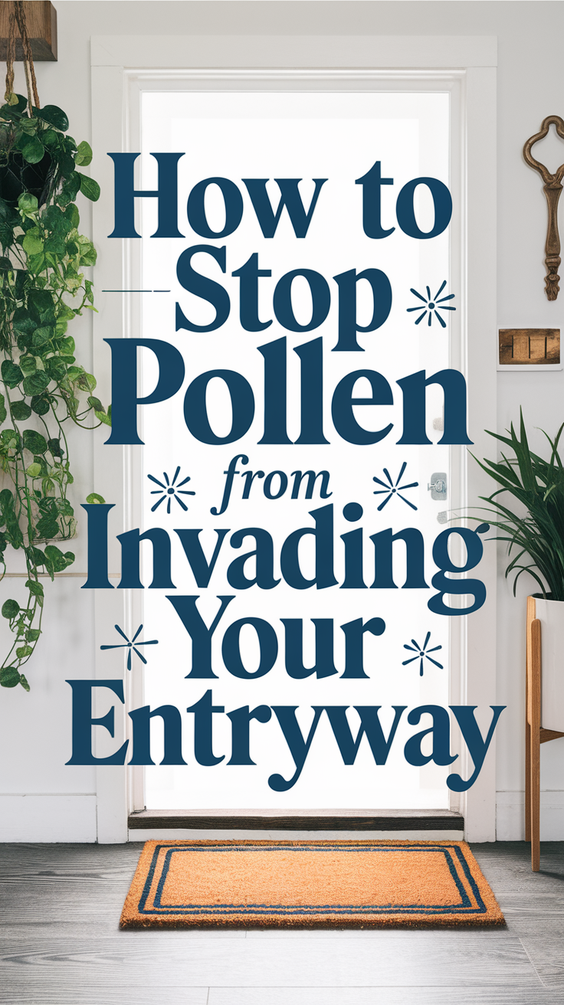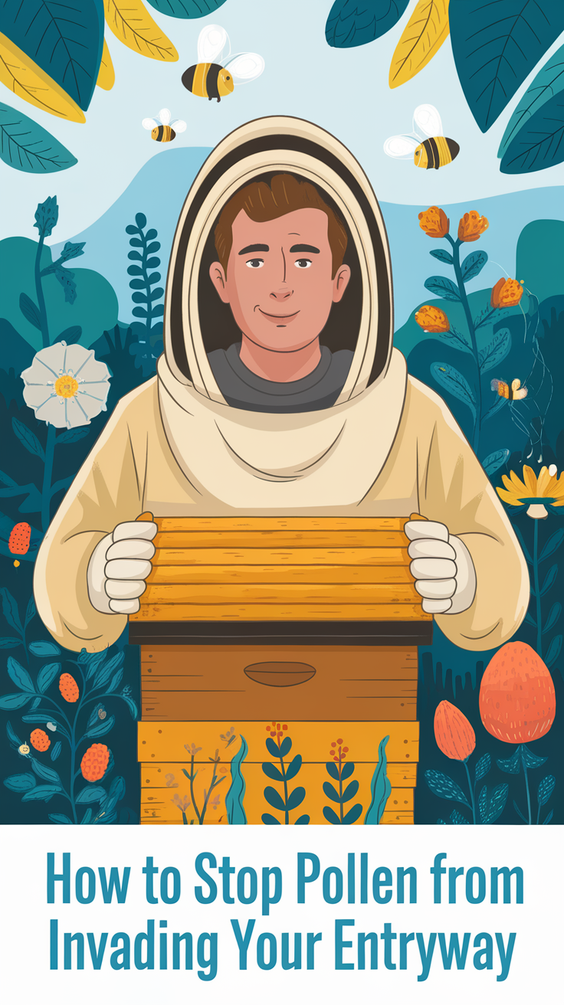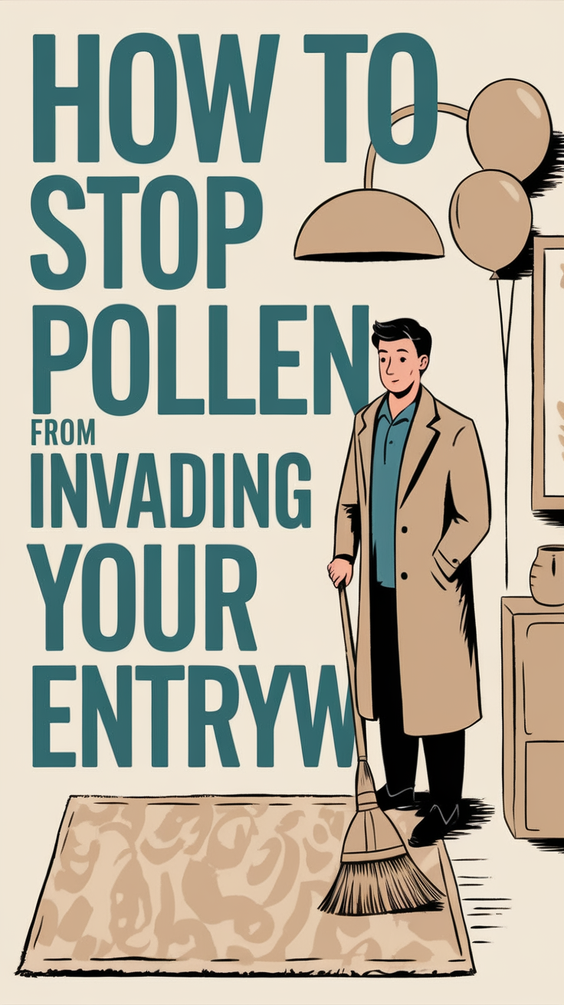How to Stop Pollen from Invading Your Entryway
The Invisible Invader at Your Door
Did you know pollen counts in the U.S. are expected to hit record highs in spring 2025?
If you’re someone who sneezes as soon as you step inside your home, your entryway might be to blame. Many of us overlook this transitional space—but it’s often the first point of entry for dust, dirt, and airborne allergens.
In this article, you’ll learn how to stop pollen from invading your entryway, using simple tools, smart layout tweaks, and modern solutions. Whether you rent or own your home, these 2025-approved tips will help protect your space—and your sinuses.
Who should read this?
Anyone with seasonal allergies, households with pets, families with kids, or anyone living in high-pollen zones will benefit from these strategies.
Why Your Entryway Is a Pollen Magnet
Your entryway acts like a sponge for the outside world.
Every time you open the front door, a gust of wind carries in tiny particles. And it’s not just the air—shoes, coats, backpacks, and even pet fur act as pollen carriers.
Common factors that contribute to pollen buildup:
Windy conditions blowing particles directly into the house
Unsealed gaps around doors and windows
Foot traffic from family members, pets, and guests
Lack of routine cleaning in the transition zone
Now here’s the kicker: 2025’s climate patterns are pushing longer, more intense allergy seasons. That makes your entryway even more critical.
The Usual Suspects: Where Pollen Hides Near Your Door
You can’t fight what you can’t see—so let’s talk about where pollen builds up.
Shoes, Clothes, and Personal Items
Your footwear is one of the biggest culprits. Pollen clings to soles, then transfers to rugs and flooring. Jackets, hats, and bags carry pollen in their fibers too.
Pets
Dogs and cats don’t just bring joy—they also bring outdoor allergens inside via their fur, paws, and collars.
Door Frames, Vents, and Screens
Gaps or poor insulation in your door frame can let in more than just a breeze. Old or damaged screens allow particles to enter freely.
Tip: In spring, even five minutes of an open door can increase indoor pollen levels significantly.
Habits That Worsen the Problem (Without You Realizing It)
You may be inviting pollen in—without meaning to.
Here are some everyday habits that make things worse:
Propping the door open for airflow or deliveries
Storing shoes right at the entrance without a tray
Shaking off jackets inside instead of outside
Skipping daily sweeping or vacuuming
Leaving windows open near the door without screens
Sound familiar? Don’t worry—these are easy to fix.
Smart Solutions to Keep Pollen Outdoors
Let’s move from problems to solutions. Below are proven tactics that work in 2025.
Create a “Decontamination Zone”
This doesn’t mean turning your hallway into a hazmat site—but it does mean being strategic. Set up a landing zone for everything coming in from outside:
Exterior door mat: Choose a coarse, weather-resistant mat.
Interior rug: Add a soft mat inside to catch remaining debris.
Shoe tray: Keeps particles from spreading on your floors.
Hooks and bins: Store jackets, hats, bags away from living spaces.
Pro tip: Go vertical! Wall-mounted storage saves floor space and limits contamination spread.
Table: Essential Items for a Pollen-Free Entryway
| Item | Why It Helps | Recommended Features |
|---|---|---|
| Outdoor Doormat | Scrapes off debris before entry | Coarse texture, rubber base |
| Shoe Tray | Contains pollen in one zone | Waterproof, raised edges |
| HEPA Air Purifier | Filters air in the entryway | HEPA filter, low-noise motor |
| Coat Hooks | Keeps clothes off floors | Wall-mounted, spaced apart |
| Microfiber Cloths | Traps and removes pollen | Washable, lint-free |
Cleaning Routines That Actually Work
Think quick and effective.
Vacuum rugs and mats 3–4 times per week with a HEPA vacuum.
Wipe down door handles, frames, and light switches using a microfiber cloth.
Mop floors with anti-allergen cleaner weekly.
Wash doormats (yes, even the outdoor one) every other week.
Avoid feather dusters—they only move pollen around. Use damp cloths to capture and trap particles.
Is your vacuum over two years old? It may not be trapping allergens effectively. Time to upgrade.
Weatherproofing Your Entryway Against Pollen
In 2025, high winds and early blooms demand better sealing techniques.
Use Weather Strips and Door Sweeps
These are inexpensive but effective ways to close off gaps.
Door sweeps block drafts and dust from under the door.
Foam or silicone weather stripping seals side and top edges.
Add a Screen Door
Modern screen doors with magnetic closures can reduce pollen entry by up to 80%—without blocking airflow.
Seal Cracks in the Frame
Use exterior caulk to seal visible gaps. Don’t forget baseboards and corner joints.
Pollen-Proof Entryway Design Ideas
A well-designed space can do the heavy lifting for you.
Avoid rugs with deep pile—they trap more pollen. Use flat-woven or indoor-outdoor rugs.
Choose hard surfaces for flooring like tile or sealed wood.
Paint with satin or semi-gloss finishes, which are easier to wipe down.
Use minimalist décor near the door to reduce dust-collecting surfaces.
Ever thought of repainting? Light colors not only feel fresh but reveal dust buildup more clearly.
High-Tech Tools That Help in 2025
Smart Air Purifiers
Place a compact air purifier near the entryway to immediately trap airborne pollen.
Brands like Dyson, Molekule, and Coway are favorites in 2025.
Look for models with smart sensors and automatic modes.
Real-Time Pollen Monitors
Devices and apps now provide street-level pollen forecasts. Use this data to:
Adjust ventilation.
Time when to walk pets.
Avoid opening windows during peak hours.
Entryway Upgrades for Families with Kids and Pets
You don’t need to be a neat freak—just strategic.
Create a brushing station for pets using a washable mat and grooming glove.
Teach kids to remove shoes and coats before walking into the house.
Label bins or hooks for each family member to reduce clutter and cross-contamination.
Want to make it fun? Add chalkboard signs with reminders—or a reward system for kids who “keep the pollen out.”
Easy DIY Projects for a Cleaner Entryway
Some weekend hacks you can try:
Build a bench with storage for shoes and bags.
Install a magnetic screen door—no tools required.
Craft a wall-mounted coat and mask rack with labeled hooks.
Use PVC or pallet wood to create a custom shoe rack.
Looking for eco-options? Use reclaimed wood, cork flooring, or repurposed crates.
Final Checklist: Seasonal Entryway Pollen Prevention
| Task | Frequency | Bonus Tip |
|---|---|---|
| Vacuum rugs/mats | 3x per week | Use cross-hatch motion |
| Wipe surfaces (handles, trim) | 2x per week | Microfiber cloth preferred |
| Mop floor | Weekly | Vinegar + warm water solution |
| Air purifier filter check | Monthly | Replace if gray or clogged |
| Wash outdoor mat | Bi-weekly | Hose down + air dry |
What Not to Do (Even If It Seems Harmless)
Don’t let packages sit by the door—they collect dust.
Avoid placing indoor plants right by the entrance during peak pollen season.
Never shake clothes or pet gear inside the house.
Skip synthetic air sprays—they can worsen allergies.
Latest Trends in Pollen Control for 2025
Nano-fiber screen doors with self-healing magnets
App-synced air monitors that alert when pollen counts spike
Green-certified floor paints that resist allergen buildup
AI-driven air purifiers that learn your habits and adjust flow automatically
These innovations are becoming more affordable—and easier to install.
Expert Advice from Allergy Specialists
“The entryway is the new front line in the allergy battle,” says Dr. Amanda Lee, allergist at Allergy & Airway Center in Denver.
Her top tip? “Keep a HEPA air purifier near your door and vacuum frequently—especially if you have pets.”
Experts also suggest monitoring pollen levels daily and adjusting your routine. A little prep goes a long way.
What Works for You?
Have you tried any of these entryway upgrades?
What’s your go-to solution during allergy season?
Let us know in the comments—and don’t forget to share photos of your own pollen-proof entryway.
In Summary: How to Stop Pollen from Invading Your Entryway
Your entryway is your home’s first defense against airborne allergens.
Use mats, storage, and routine cleaning to reduce buildup.
Weatherproof and redesign for both function and style.
Add tech tools for a smarter, cleaner space.
Small changes today can mean fewer sneezes tomorrow.
What’s your next step? Try one change this week and see how much cleaner your space—and your breathing—feels.



